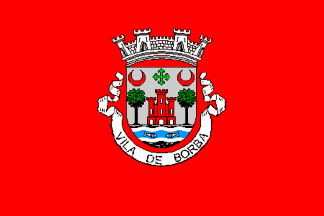
Last modified: 2007-06-09 by antónio martins
Keywords: borba | coat of arms: castle | crescent: points up (red) | crescents: 2 |
Links: FOTW homepage |
search |
disclaimer and copyright |
write us |
mirrors

The flag is a plain red flag with the arms in the centre. The arms
are as typical as you can get: a 4-towered mural crown, a scroll reading
"VILA DE BORBA" and a silver sheld with sable
counterchef. The shield is charged in chef by a green
cross of Avis sided by two red crescents pointing
upwards, in the middle by a red castle with white door and windows sided by
two trees proper, and in counterchef by a white-blue-white wavy line with two
silver fishes facing the center. Heavy, but relatively nice.
Jorge Candeias, 18 Nov 1998
Guessing the meaning of the arms, I’d say that the crescents are related to
the moors and the cross to the Order of Avis (the town
of Avis is not that far away, and it’s likely that the
territory of Borba was part of the Order’s dominions), the wavy line may stand
for one (or both) the creeks that spring near the town and cross the municipality:
Ana Loura and Lucefece. I don’t know about the fishes, maybe they are related to
some legend or to christianity, the castle stands for the fortifications of the
town, as usual, and the trees may well stand for the land and it’s richnesses.
Jorge Candeias, 18 Nov 1998
Plain (monocolored) portuguese subnational flags are
not allowed to have armless
variations: plain flags always carry the coat of arms.
Jorge Candeias, 18 Jul 1999
Borba is a town in Alentejo
(Alto Alentejo traditional province),
Évora district. The municipality
is one of the smallest municipalities in Alentejo, be it in area
(145,1 km²), in number of inhabitants (slightly over
8000) or in number of communes (4). The municipality is rural,
mainly known for its wine.
Jorge Candeias, 18 Jul 1999
Anything below this line was not added by the editor of this page.